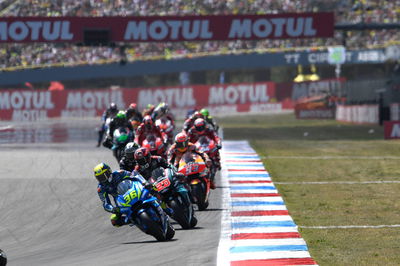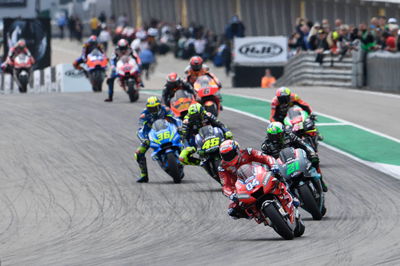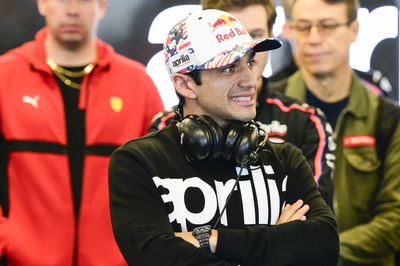Ezpeleta explains MotoGP cancellations, calendar plans
Dorna CEO Carmelo Ezpeleta has explained why, after postponing previous events, the decision was taken to cancel the German, Dutch and Finnish MotoGPs.
The Spaniard also reiterated plans to start the heavily-delayed 2020 season in July, through use of extensive testing of paddock members for the coronavirus, plus the planned shape of the world championship schedule.

Dorna CEO Carmelo Ezpeleta has explained why, after postponing previous events, the decision was taken to cancel the German, Dutch and Finnish MotoGPs.
The Spaniard also reiterated plans to start the heavily-delayed 2020 season in July, through use of extensive testing of paddock members for the coronavirus, plus the planned shape of the world championship schedule.
With the respective authorities extending a ban on public gatherings until at least the end of August, the only way the Sachsenring, Assen and KymiRing rounds might have gone ahead was as a 'closed-door' event. But it seems that wasn't viable.
"Any of these [three] Grands Prix without spectators is very difficult to do," Ezpeleta said. "It’s for that reason that we’ve decided with the three local promoters to pass onto next year, instead of putting them on a new date."
Addressing the loss of the Dutch TT, part of the world championship calendar since the inaugural 1949 season, Ezpeleta added: "This coronavirus problem is something we’ve never seen and so unfortunately [Assen] is not a possibility.
"The authorities of the Netherlands have forbidden events until the end of August and so it’s completely impossible [until then]. After that in Assen it will be difficult to organise a Grand Prix and more difficult again without spectators."
Assen boasted the biggest race day crowd of last year at 105,000, with the Sachsenring was one of three events to pull in over 200,000 weekend fans. The KymiRing situation was further complicated by the need to receive circuit homologation and host a tyre test.
'Difficult to have spectators at the races'
It now seems that any races held this year will take place without fans.
"It will be difficult to have spectators at the races but we will have our fantastic television coverage which will permit the majority of people to watch the races," Ezpeleta confirmed.
The trio of cancellations mean that Brno on August 9 is now the earliest listed event. However, the 74-year-old outlined plans for a late July start, which would mean slotting in one of the postponed races or bringing an event forward from later in the season.
"Our idea right now is to start at the end of July. Where and when are still to be decided," he said.
Europe from July until November
What we do know is that the opening event, and perhaps all of the shortened season, will be held in Europe. If so, racing will conclude at the end of November, due to the climate.
If any non-European events are possible, the championship will then go on into December.
"We’re sure our initial program is to start in Europe and race from the end of July until November and see what’s happening, and if the non-European races will be possible after November," Ezpeleta said.
"In the worst case, if it’s not possible to travel outside of Europe, we’ll at least keep a Championship of least 10 to 12 races between the end of July and the end of November."
But that doesn't mean there would be 10-12 different venues.
"We are considering doing two consecutive race weekends at the same circuit," Ezpeleta said.
So that's potentially only five or six circuits.
Testing, testing…
But before a calendar can be announced, MotoGP must be granted permission to hold even a 'closed-door' event by the relevant authorities in the host country.
Key to this is MotoGP's plan to test paddock members before, during and after travelling to each venue.
"Everyone will be tested before leaving their house, then tested when they arrive at the circuit and also when they return home. This is the idea," Ezpeleta explained. "We are working with another company which belongs to Bridgepoint [owner of Dorna] to acquire 10,000 tests."
Whether such testing (alongside social-distancing efforts and perhaps use of facemasks) will that be enough to persuade a host nation to allow an international gathering of 1,600 people remains to be seen, but MotoGP must be confident that at least several countries will do so.
"What we are doing is to try to make a protocol... To see how the races could be without spectators and a limited number of people working in the paddock, which will give different situations regarding transportation, accommodation, hospitality," said Ezpeleta.
"The maximum number" of staff allowed in the paddock "for a MotoGP manufacturer team will be 40, for satellite or independent teams will be 25, 20 for Moto2 and 15 for Moto3.
"Then there will be… all the people who produce the television signal… The minimum number of people from Dorna who are in charge of race organisation. This will give us an average of around 1600 people.
"Unfortunately at the moment there will be no media and no TV… Maybe some photographers to supply images to everybody."
Austria is being pencilled in for the start of the F1 season in early July. If all passes without issue, the Red Bull Ring would be sure to host at least one race of the revised MotoGP season, currently holding a date of August 16.
Spain (the destination for the freight from Qatar) would be another likely host since it has four different grand prix circuits within its borders. However, Ezpeleta is confident air travel will soon be possible.
"The first program we are thinking of [is] the possibility to move by car [between events] if necessary but I think that by July, with many safety measures, it will be possible to fly within Europe," he said.
WorldSBK after MotoGP
As commercial rights holder for both MotoGP and WorldSBK, there had been speculation that combined race weekends could be possible, although these would inflate paddock numbers even further.
Instead, WorldSBK might be held the weekend after MotoGP.
"The idea is that because many of the circuits we will plan to be at for MotoGP also do Superbike races, then we will be maybe able to have a Superbike race the weekend immediately after a MotoGP race," Ezpeleta said.
Red Bull Ring, Jerez, Aragon, Catalunya, Misano?
Given Ezpeleta's words, here are the venues that are set to host both MotoGP and WorldSBK this season and, as such, appear most likely to join Austria as part of the proposed final 2020 calendar: Jerez, Aragon, Catalunya, Misano.
Those five venues would provide a ten-race season if two rounds were held at each track.
WorldSBK events in Qatar and now Assen have been cancelled for MotoGP, while Phillip Island has already held its SBK round.












